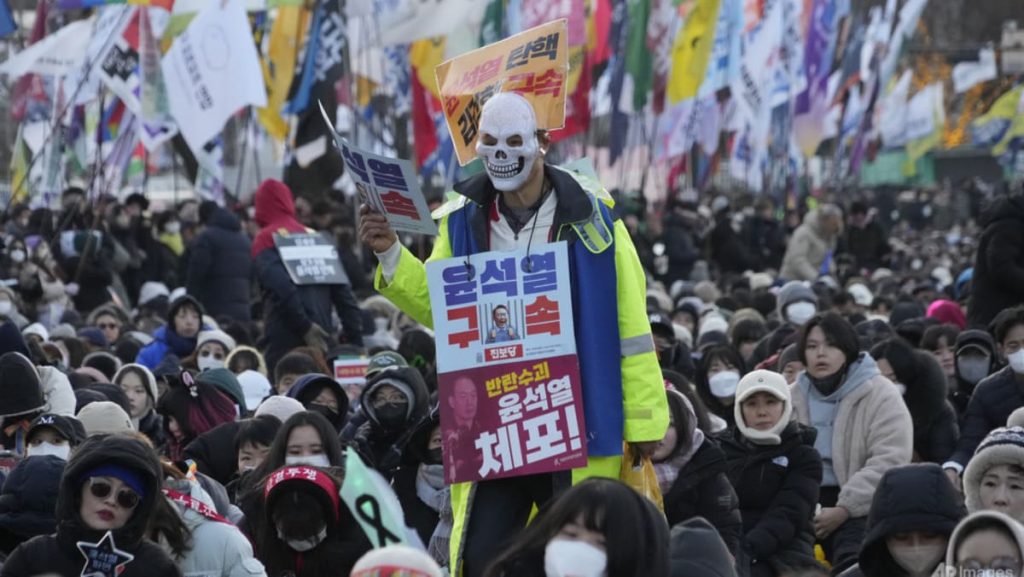The Rise of Gendered Politics in South Korea: Yoon Suk-yeol and the Appeal to Young Men
The presidency of Yoon Suk-yeol in South Korea has been marked by a distinct and arguably divisive appeal to young men, a demographic that played a pivotal role in his electoral victory. This strategy, while politically effective, has raised concerns about the deepening gender divide in South Korean society and the potential marginalization of young women’s concerns. Yoon’s courtship of young male voters during the 2022 election campaign centered on controversial stances, including the denial of systemic discrimination against women and a pledge to dismantle the Ministry of Gender Equality. These positions resonated with a segment of young men who felt alienated by what they perceived as preferential treatment towards women and a disregard for their own economic struggles. Exit polls revealed a stark gender divide, with Yoon securing approximately 58% of the male vote in their 20s, while his liberal opponent, Lee Jae-myung, garnered a similar percentage from women in the same age group. This electoral outcome underscores the effectiveness of Yoon’s targeted approach and the growing polarization of South Korean politics along gender lines.
Exploiting Anxieties and Assigning Blame: The Yoon Administration’s Approach to Governance
Critics argue that Yoon’s administration has strategically capitalized on the anxieties of young men, particularly their economic insecurities, while simultaneously dismissing the concerns of young women. This deliberate focus on a specific demographic is seen as a calculated political maneuver designed to consolidate power and maintain a core base of support. By framing societal problems as stemming from feminist influences and immigration, the Yoon administration has effectively shifted blame away from its own policies and onto convenient scapegoats. This rhetoric resonates with a segment of young men who feel disenfranchised and perceive themselves as victims of reverse discrimination. Professor Kwon Soo-hyun of Gyeongsang National University argues that Yoon’s approach has effectively rendered young women invisible in the political landscape, prioritizing the concerns of young men to secure their electoral support. This strategy, while politically expedient, risks exacerbating the gender divide and further marginalizing the voices and needs of young women.
The Widening Chasm: Generational Divide and Political Polarization
The political climate under Yoon’s leadership has amplified pre-existing tensions between generations and further entrenched the gender divide among South Korea’s Gen-Z. The polarization is evident in the starkly contrasting viewpoints on key political issues, making constructive dialogue and consensus-building increasingly challenging. The generational gap is not simply a matter of differing opinions but reflects deeply ingrained beliefs and values, making it difficult to bridge the divide through rational discourse. This polarization is fueled by the echo chambers of social media and the selective consumption of information, reinforcing existing biases and hindering meaningful engagement with opposing perspectives. The case of Yang Ui-bin, a 25-year-old holding a "Stop the Steal" sign, exemplifies the difficulty in bridging the communication gap. His experience of being unable to persuade his friends, regardless of the evidence presented, highlights the deep-seated distrust and the tendency to dismiss opposing viewpoints as inherently invalid. This polarization not only hinders productive political discourse but also strains personal relationships, creating social fragmentation.
The Socioeconomic Underpinnings of Political Division:
The economic anxieties of young South Koreans, particularly men, play a significant role in the rise of conservative sentiment and the appeal of Yoon’s political platform. Faced with a challenging job market, rising housing costs, and a sense of limited economic opportunity, many young men are drawn to narratives that offer simple explanations and readily identifiable scapegoats. The perception that women and immigrants are unfairly benefiting at their expense provides a convenient target for their frustrations. This economic anxiety is further compounded by the increasing competitiveness of South Korean society, where success is often equated with academic achievement and prestigious employment. The pressure to succeed in this highly competitive environment can contribute to feelings of resentment and a sense of being left behind, making young men susceptible to political messaging that exploits these vulnerabilities.
The Consequences of Gendered Politics: Implications for South Korean Society
The consequences of Yoon’s gendered political strategy extend beyond the immediate political landscape, impacting the broader social fabric of South Korea. The deepening polarization between men and women hinders progress on critical social issues that require collaborative solutions. The dismissal of women’s concerns risks perpetuating existing inequalities and undermining efforts to achieve greater gender equality. Furthermore, the divisive rhetoric employed by the Yoon administration can contribute to a climate of hostility and distrust, making it increasingly challenging to address societal challenges effectively. The focus on scapegoating specific groups can also lead to increased discrimination and marginalization, further exacerbating social divisions.
The Future of South Korean Politics: Navigating the Gender Divide
Moving forward, South Korea faces the challenge of bridging the gender divide and fostering a more inclusive and equitable political landscape. This requires addressing the underlying economic anxieties that fuel resentment and contribute to polarization. Promoting open dialogue and fostering empathy between different groups is crucial for building a more cohesive society. Furthermore, political leaders must acknowledge the validity of diverse perspectives and avoid exploiting societal divisions for political gain. The future of South Korean politics hinges on the ability to move beyond divisive rhetoric and embrace collaborative solutions that address the needs of all citizens, regardless of gender. Only by fostering a more inclusive and equitable society can South Korea overcome the current challenges and build a more prosperous and harmonious future.

